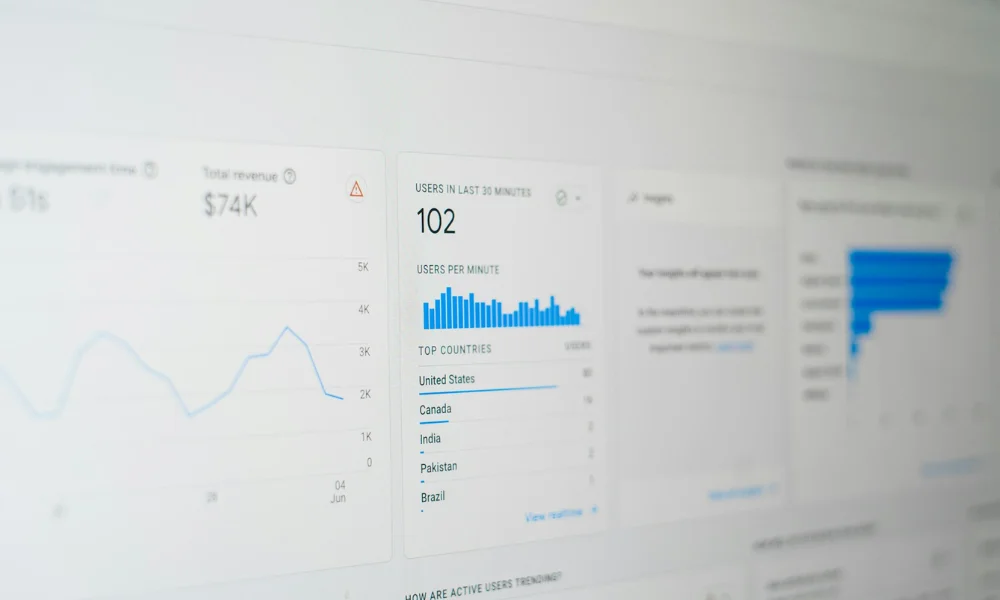Industrial SEO is a specialized digital marketing method that helps B2B manufacturing and industrial companies improve their search engine visibility to attract high-quality prospects and generate high-value leads.
What Is Industrial SEO and Why Does It Matter?
Industrial SEO is a straightforward approach to improving website performance in search engines. It’s made just for manufacturing and factory companies that sell to other businesses. It’s not like regular SEO because business sales take longer to happen.
The manufacturing world has undergone significant changes with the advent of computers and the internet. Today, 93% of people start looking for things online using search engines. Also, 75% of people never look past the first page on Google. Studies show that 57% of business marketers think SEO brings in more customers than any other way to advertise.
How B2B Industrial SEO Optimisation Works
Business buyers conduct extensive research before making a purchase. They often ask many people and take a long time to decide. This means industrial SEO must help create helpful content that answers hard technical questions.
Factory customers look for very specific information. They want to know exact details, certifications, and success stories. They need detailed product information and proof that a company knows what they’re doing.
Why Manufacturing SEO Differs from Regular SEO
Manufacturing companies sell to different people than regular businesses. Their customers are engineers, people who buy supplies, and bosses who make technical decisions. These people search the internet differently and need different kinds of information.
Industrial SEO targets special keywords that fewer people search for, but show they really want to buy something. These special words often indicate that the person is closer to making a purchase, making them more valuable than popular keywords used by many people.
How Can Manufacturers Optimise Industrial SEO?
Manufacturing SEO works differently from regular SEO because business customers behave differently from everyday shoppers. Business buyers have special ways of searching and need different kinds of information.
Regular SEO focuses on popular keywords and quick sales. Industrial SEO targets technical words and helps with longer sales that take months. It creates content that teaches rather than just tries to sell products right away.
Technical Search Behaviour
Factory buyers look for solutions to problems first, then they look for specific products. They use technical words and industry terms that are unfamiliar to the general public. This means that finding the right keywords requires a deeper understanding of specialised language.
Engineers might search for “rust-proof pipeline coatings” while regular people search for “pipe repair.” The factory term has fewer searches but a much higher value because it indicates a specific purchase intent.
Longer Sales Cycles Impact
Business factory sales can take months or years to finish. SEO must help potential customers throughout this long journey with different types of content. Early content discusses problems, while later content provides specific details and evidence.
This long timeline means measuring SEO success differently. Quick sales matter less than building trust and showing expertise over time through helpful content that keeps coming.
What Are the Core Industrial SEO Elements That Work?

Effective industrial SEO campaigns utilise several key components that work together to improve a website’s visibility in search results and attract quality customers. Each part helps the others to create complete plans that work.
Learning these parts helps manufacturing companies build focused plans that deliver tangible business results rather than just more website visitors who don’t buy anything.
Industrial SEO Keyword Research Best Practices
Factory keyword research requires a deep understanding of technical terms, industry-specific language, and the target audience. Manufacturing companies should target long phrases that show how real decision-makers search for solutions.
Main keywords include product types, exact details, and how products are used. Secondary keywords cover fixing problems, comparing options, and certification requirements. Searches that include locations also matter for local manufacturers.
Technical SEO for Manufacturing Websites
Manufacturing websites have unique technical challenges that can hurt search performance. Extensive product catalogues, complex navigation, and technical documentation need careful optimisation for search engines to crawl and index effectively.
Site speed becomes critical when serving technical drawings, specifications, and multimedia content. Companies should use content delivery networks, optimise image compression, and minimise code bloat for better performance.
Manufacturing SEO Content Strategy That Converts
Factory content must strike a balance between technical accuracy and what search engines require. Manufacturing businesses require comprehensive resources that demonstrate their expertise while being easily understandable by search engines.
Content should help people at every stage of the buying process. Early content focuses on industry problems and trends. The middle content gives detailed comparisons and exact details. Final content includes success stories and how-to guides.
How Is Manufacturing SEO Different from Traditional SEO?
Making content work better for factory companies means striking a balance between technical accuracy and what search engines need. Manufacturing businesses must create comprehensive resources that demonstrate their expertise while remaining easily accessible.
Each piece of content should target specific keywords while giving real value to potential customers. Technical blog posts, how-to guides, and problem-solving resources often work well in search results.
Creating Problem-Focused Content
Factory buyers often seek solutions to operational issues before looking for specific products. Companies should create content that addresses pain points and explains how their products are used, rather than focusing solely on features and details.
Problem-focused content attracts potential customers earlier in their buying process. It builds trust by demonstrating the company’s understanding of customer challenges before attempting to sell products or services.
Technical Documentation SEO
Product details, installation guides, and technical manuals can attract a significant number of website visitors when done right. These documents often target high-value keywords that competitors usually overlook.
Technical docs should have clear titles, easy headings, and keyword-rich descriptions. They need proper links to other pages and a mobile-friendly design, as many users access them on tablets and phones.
Industrial SEO Case Study Optimisation Techniques
Success stories show real-world results and build trust with potential customers. They should target keywords related to product usage, various industries, and outcomes, rather than just product names.
Each success story should focus on specific challenges, solutions, and results you can measure. This approach targets problem-focused searches while giving social proof for decision-makers.
What Role Does E-E-A-T Play in Manufacturing SEO?
Google’s E-E-A-T rules (Experience, Expertise, Authority, Trustworthiness) are essential for factory companies. Manufacturing businesses must show deep industry knowledge and a proven track record to rank well in search results.
E-E-A-T affects how Google decides if content is good quality and valuable. Factory companies with strong E-E-A-T signals often beat competitors with weaker authority signs.
Demonstrating Experience
Experience means showing real-world use of products and services. Factory companies should highlight successful projects; customer uses, and problem-solving abilities through detailed success stories.
Project portfolios, customer testimonials, and photos of work provide strong experience signals. They demonstrate to potential customers that the company has successfully solved similar problems in the past.
Building Expertise Signals
Expertise means demonstrating technical knowledge through the creation of helpful content. Manufacturing companies can show expertise by publishing detailed technical guides, industry analysis, and thought leadership content.
Content writers should have real credentials and experience. Bio pages, author profiles, and professional certifications help establish individual and company expertise for search engines and potential customers.
Authority and Trust Factors
Authority comes from industry recognition, certifications, and third-party validation. Trust develops through being transparent, giving accurate information, and maintaining consistent quality over time.
Certifications, awards, and industry memberships provide authority signals. Customer reviews, testimonials, and success stories build trust with both search engines and potential customers.
How Do You Measure Industrial SEO Campaign Success?

Factory SEO success measurements differ significantly from those of regular online shopping campaigns, as business sales take longer and are worth more money. Manufacturing companies should track numbers that align with how businesses purchase products.
Traditional online store metrics, such as immediate sales, don’t work well for factory SEO. Success measurement must account for longer research periods and the multiple visits people make before buying.
Lead Quality Metrics
Qualified lead generation serves as the primary success metric for industrial SEO campaigns. Companies should track organic traffic from target keywords, form submissions, whitepaper downloads, and quote requests.
Lead scoring helps identify which organic visitors are most likely to become customers. This data shows SEO’s impact on business outcomes rather than just website traffic.
Industrial SEO Engagement and Authority Metrics
Time on page, page depth, and return visitor rates indicate content quality and relevance. These metrics show how well content serves prospect needs and supports buying decisions.
Brand search volume and direct traffic increases suggest growing authority and awareness from SEO efforts. These metrics often improve before lead generation metrics show results.
Long-Term Revenue Attribution
Conversion tracking becomes complex in B2B environments where sales cycles extend over months or years. Manufacturing companies should implement multi-touch attribution models that credit SEO throughout extended buyer journeys.
Customer lifetime value and deal size data help calculate SEO’s actual impact on business growth. This information justifies continued investment in organic search strategies.
What Common Industrial SEO Mistakes Should You Avoid?
Many manufacturing companies struggle with SEO implementation due to unique industry characteristics and traditional marketing approaches. Understanding common pitfalls helps industrial businesses develop more effective strategies.
Learning from these mistakes saves time and resources while accelerating results. Most errors come from applying consumer SEO tactics to B2B industrial markets without proper adaptation.
Focusing Only on Product Keywords
One frequent mistake involves focusing exclusively on product keywords while ignoring problem-focused queries. Industrial buyers often search for solutions to operational challenges before identifying specific products.
Companies should create content that addresses pain points and applications, rather than just promoting features. Problem-focused content attracts prospects earlier and builds trust before sales conversations.
Neglecting Local SEO
Another standard error involves neglecting local SEO optimisation. Many manufacturing companies serve regional markets but fail to optimise for location-based searches and local business listings.
Industrial businesses should claim Google Business profiles, optimise for local keywords, and develop location-specific content. Local SEO often provides easier wins than competing nationally.
Ignoring Manufacturing SEO Technical Issues
Manufacturing websites often have technical issues that hurt search performance. Extensive product catalogues, slow loading times, and mobile problems prevent search engines from properly indexing content.
Regular technical audits identify crawling issues, page speed problems, and mobile optimisation opportunities. Fixing these problems often provides immediate ranking improvements.
How Can Small Manufacturing Companies Win at Industrial SEO?
Small industrial companies can effectively compete against larger competitors through focused niche strategies and specialised expertise demonstration. Smart targeting beats big budgets in many industrial markets.
Rather than competing on broad industry terms, smaller manufacturers should target specific applications, specialized processes, or underserved market segments.
Niche Market Targeting
Small companies should focus on specialised applications or specific industries rather than trying to rank for general manufacturing terms. Niche targeting faces less competition and attracts more qualified prospects.
Specialised expertise in specific processes, materials, or applications can outrank general competitors. Deep knowledge of niche markets creates content opportunities that larger companies miss.
Local Market Domination
Local SEO provides significant opportunities for regional manufacturers. Small companies can dominate local search results by optimising for geographic keywords and building local citations.
Regional manufacturers can compete effectively by targeting “near me” searches and location-specific terms. Local market focus often delivers better results than national competition.
Content Marketing Advantages
Content marketing enables smaller manufacturers to showcase their expertise and build authority without the need for massive budgets. Publishing detailed technical content helps establish credibility and attract qualified prospects.
Small companies can move faster and create more personalised content than large competitors. This agility advantage helps build relationships and demonstrate expertise effectively.
What Industrial SEO Tools Are Essential for Success?

Industrial SEO requires specialized tools that accommodate B2B keyword research, technical auditing, and performance tracking. Manufacturing companies should invest in platforms that understand industrial search patterns.
The right tools help identify opportunities, track progress, and optimize strategies for better results. Tool selection should match company size, budget, and specific needs.
Manufacturing SEO Keyword Research Tools
Professional keyword research tools help identify technical terminology and niche opportunities that generic tools might miss. Industrial companies benefit from platforms that provide industry-specific suggestions.
Tools should show search volume, competition levels, and keyword difficulty for technical terms. They should also identify related questions and long-tail variations that prospects use.
Industrial SEO Technical Auditing Tools
Technical SEO auditing tools become essential for manufacturing websites with complex product catalogs and technical documentation. These platforms identify issues that impact search performance.
Auditing tools should check page speed, mobile optimization, crawlability, and indexation issues. They should also monitor for broken links, duplicate content, and other technical problems.
Analytics and Tracking Platforms
Comprehensive analytics help track SEO performance and measure business impact. Tools should integrate with CRM systems to track leads and conversions from organic search traffic.
Analytics should show which keywords drive qualified traffic, which pages generate leads, and how SEO supports the sales funnel. This data guides strategy optimization and budget allocation.
Conclusion
Industrial SEO represents a robust growth strategy for manufacturing and industrial companies seeking to expand their digital presence and generate qualified leads. Success requires understanding B2B search behaviour and implementing a specialised strategy.
By focusing on technical content, building authority through expertise, and measuring appropriate metrics, industrial companies can achieve significant competitive advantages. The key is adapting SEO strategies to match industrial buying patterns and customer needs.










